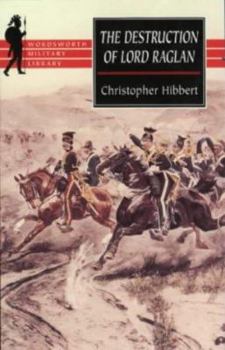The Destruction of Lord Raglan
Select Format
Select Condition 
Book Overview
In March 1854, a British army of 30,000 men sailed for the Crimea to defend the crumbling Turkish empire from Russia. It was led by Lord Raglan, a verteran of Waterloo. The campaign quickly... This description may be from another edition of this product.
Format:Hardcover
Language:English
ISBN:1840222093
ISBN13:9781840222098
Release Date:January 1999
Publisher:Wordsworth Editions
Length:352 Pages
Weight:0.90 lbs.
Customer Reviews
2 ratings
A Must-read Military Biography and History
Published by Thriftbooks.com User , 15 years ago
The Crimean War brought the armies of Britain, France, Turkey, Russia, and eventually Sardinia (Italy) to fight on the shores of the Black Sea's Crimean Peninsula. One product of this conflict was the creation of tens of thousands of letters, personal memoirs, official histories, and modern accounts of the battles and the related war that today fill the shelves of the world's libraries, archives, and perhaps even today its attics. This resulted in great part not only from the efforts of Mr. Russell of The London Times, the first modern war correspondent, and his colleagues, but also from the many literate veterans of this conflict, especially from England. The Crimean War was probably the first war to produce so many accounts from the soldiers in the ranks instead of just the army commanders and senior officers. With such raw material to work with it is little wonder that the library on the Crimean War has continued to grow as historians continued to work through it. Over his career, historian Christopher Hibbert has written many excellent works recounting the history and/or biography of places, events, and individuals both British and non-British. He presented his contribution on the Crimean war in 1961 in the form of this biography/military history centered upon the role the of the British Army's Commander, Lord Raglan, before and during the war in the Crimea. Curiously, Hibbert's book appeared at about the time that I first read Cecil Woodham-Smith's "The Reason Why" and discovered the body of scholarship on this conflict that was relatively forgotten and unknown in the United States at that time. Woodham-Smith's work was an important contribution to scholarship and popular literature on the war, first published in 1953, and telling the story of the Charge of the Light Brigade at the Battle of Balaclava (immortalized in Longfellow's poem, The Charge of the Light Brigade). I really regret that it took me this long to discover Hibbert's book because having finally read it I consider "The Destruction of Lord Raglan" to be one of the best English-language histories of the Crimean War. If you want to study this conflict, you have to include `Lord Raglan' in your readings. Published almost 50 years ago, Hibbert's work obviously does not reflect the scholarship of recent years. However, he was the first author to make extensive use of Lord Raglan's own correspondence and papers in both the Royal Archives at Windsor Castle, but also those held at the Royal United Services Institute. In his acknowledgements, the author makes further note of the many other sources upon which he drew in researching Lord Raglan and the Crimean War. The Sources listed in the published work extend for almost eight pages and include English, French, and Russian language sources. Christopher Hibbert writes that no one interested in learning and writing about the Crimean War can avoid W.A. Kinglake's masterful nine volume history, "The Invasion of the Crimea,
Outstanding account of largely forgotten events
Published by Thriftbooks.com User , 16 years ago
Hibbert does an excellent job covering the British role in the Crimean War. He provides clear insight into the poor state of the British army at the time, the strategic and tactical considerations and dilemmas of the Crimean campaign, and the delicate diplomacy involved in maintaining a coalition of Brits, French, and Turks. His accounts of the battles of Balaclava and Inkerman are particularly engrossing and he sensitively conveys the confusion and waste of both battles. As the title suggests, the central figure in the book is Lord Raglan, whose reputation was battered by the war. Hibbert cogently and convincingly argues that, while Raglan's staid personality was not ideal for his role, he was in fact a diligent and conscientious commander who was in an impossible position.




